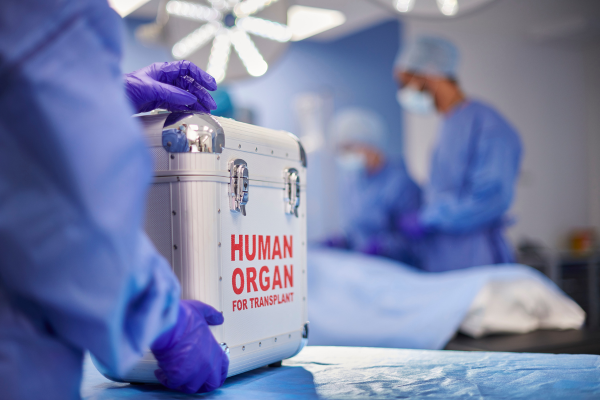Organ transplantation has become an important treatment for certain diseases that cause severe organ damage. In Alpha-1 Antitrypsin Deficiency, transplantation can be considered in those with end stage lung or liver disease, and very rarely both. A successful lung transplant can give patients a new life — free of emphysema, shortness of breath, and supplemental oxygen. A successful liver transplant can provide the recipient with a healthy liver making normal alpha-1 antitrypsin protein.
So why not transplant all Alphas at the first sign of emphysema or cirrhosis or when these conditions worsen to the point that they affect someone’s life?
First, an organ transplant, especially lung or liver, is major surgery and carries a risk of death due to the procedure or soon after the procedure. The risk is small but real. In addition, lung transplantation does not necessarily increase the life span of the Alpha who receives it. The most recent International Society for Heart and Lung Transplantation Registry reports that about 85% of lung transplant recipients survive the first year after transplant and only 59% survive five years. Liver transplant survival is better than those with a lung transplant, with about 75% of people who undergo liver transplant living for at least five years.
Additionally, transplant recipients must take a variety of medications to prevent the body from rejecting the organ they receive. These anti-rejection drugs work by dramatically suppressing the body’s immune system and this immunosuppression can increase the risk of viral, bacterial, and fungal infection as well as increase the risk of certain cancers. Because of the intentionally impaired immune system, potent antibiotics, antifungals, and antivirals must be used, often with substantial side effects. The increased mortality of lung transplantation compared with liver transplantation is often due to chronic rejection which gradually decreases the capacity of the lungs to bring oxygen into the body. There is no highly effective treatment for chronic rejection, although some therapies may slow its progression.
There are rules set up by national and international transplant organizations defining who qualifies for a transplant. These organ allocation rules try to give the highest priority to those who will benefit most from the transplant and will have the best chance of surviving the procedure and living well with their new lungs or liver.
A successful organ transplant can lead to years of improved quality of life and a reduction or elimination of symptoms related to Alpha-1 lung or liver disease. However, with the additional burden of immunosuppression and rejection, in some ways, individuals who receive a transplant trade one condition for another – lung disease or liver disease for immunosuppression and organ rejection.
Progress is being made each year aimed at reducing the complications of organ transplantation. Each year sees improvements in survival and quality of life for transplant recipients. Many in the Alpha-1 community know Alphas who are living long and healthy lives with their transplanted organs. But they also know those who have passed away after transplantation. Lung transplant recipients have been known to say that the procedure was worth it for that first breath they took after their transplant surgery.
To learn more about organ transplants for Alphas, check out the Big Fat Reference Guide to Alpha-1:
Lung Transplants for Adults
Liver Transplants
Liver Transplants in Children
